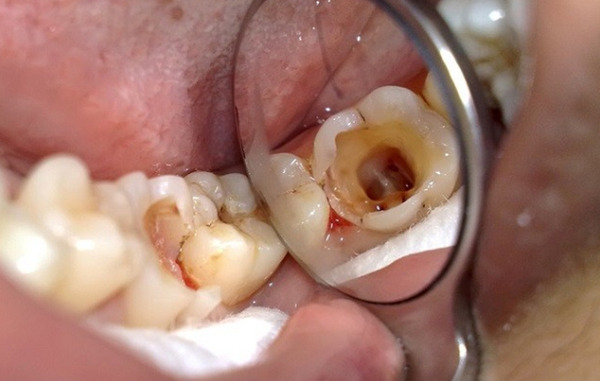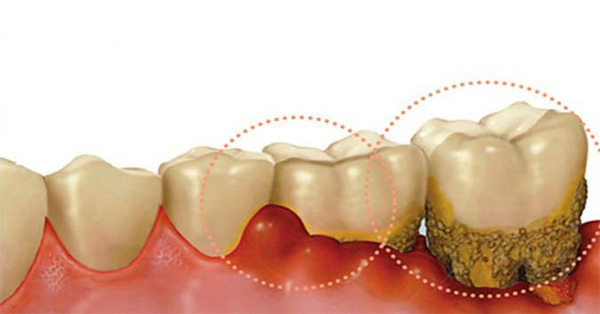Root inflammation: Causes, complications and effective treatment from a dental specialist
Toothache is a fairly common and dangerous disease but often overlooked by many people. To understand the causes, complications of the disease as well as effective treatment and prevention methods, follow the following article immediately!
1. What is periodontitis?
Although this is a fairly common disease, not everyone knows what periodontitis or periodontitis is.
Gum disease is an oral disease that can appear at any age and gender. Even children as young as 1 or 2 years old can develop tooth decay.

When the disease occurs, it means that the tissues around the teeth are attacked by bacteria, leading to swollen, inflamed, and red gums. The patient will feel pain and discomfort. If not treated promptly and properly, the disease can develop seriously, leading to the risk of loose teeth, tooth loss, tooth fracture, and many other dangerous complications.
2. Causes of periodontitis
- Bacteria in dental plaque: One of the main causes of tooth decay is due to poor oral hygiene, creating conditions for plaque to form and develop into tartar. After a while, tartar causes the gums to become infected, red, swollen, and even bleed. When this condition is more severe, it will lead to tooth inflammation.
- Crowded, misaligned teeth: When teeth grow unevenly, crowded, and misaligned, plaque and tartar are easier to form, increasing the risk of periodontal disease. If the patient has a habit of smoking, periodontal disease is even worse.
- Tooth decay: If tooth decay is not treated early, the bacteria that cause tooth decay will attack the root of the tooth causing inflammation.

- Teeth grinding often: People who have a habit of grinding their teeth will make the gum inflammation worse, indirectly causing inflammation of the teeth.
- Dry mouth: People with dry mouth are at high risk of developing periodontitis because the mouth does not produce enough saliva, giving plaque a chance to form. The cause of dry mouth can be a side effect of using high blood pressure drugs, antidepressants.
- Hormonal fluctuations: When hormones are not stable, the risk of tooth disease is also higher. That is why the disease often appears in pregnant women and children during puberty.
- Other causes: Vitamin C deficiency, malnutrition, blood diseases, female hormone changes are also causes of periodontitis.
3. Signs to recognize tooth inflammation
- There are pockets of pus around the roots of the teeth and they can burst at any time.
- Around the root of the tooth feels painful, uncomfortable, red swollen gums, even separated from the tooth root, leading to receding gums.
- Teeth are loose, sharp pain, more serious is tooth loss.
- Your mouth has a bad odor, especially when you haven’t brushed your teeth or when you just woke up.
- The root of the tooth bleeds a lot and gradually becomes more sensitive.

4. Dangerous complications due to inflammation of the tooth root
Currently, many people wonder if toothache is dangerous or if not treated, what complications can it lead to? It must be affirmed, this is a dangerous disease and can lead to many serious complications such as:
- Atherosclerosis, heart disease: Tooth inflammation not only affects chewing, causing serious dental diseases, but it is also the cause of an increased risk of blockage, atherosclerosis and heart disease. should be worse.
- Stroke: Without prompt treatment, it can make a person more likely to have a stroke.
- Premature birth: Pregnant women with diseases of periodontitis have a higher rate of preterm birth than normal. In addition, the newborn is also low birth weight.
- Diabetes: People with diabetes, if they have additional periodontal disease, inflammation of the gums, the more difficult it is to control blood sugar.
- Respiratory disease: The bacteria that cause periodontitis can cause a lung infection that makes breathing more difficult.
5. How to effectively treat periodontitis?
5.1. How to cure toothache at home
- Salt water: Mix warm salt water to gargle 3 times a day. Salt water will help disinfect, thereby reducing symptoms of inflammation and swelling.
- Fresh Ginger: Slice the ginger and boil it with water for 15-20 minutes. Gargle with fresh ginger juice 3 times a day. You can also combine drinking fresh ginger juice or dried ginger to reduce inflammation.
- Garlic: Crush garlic with salt to apply to the inflamed tooth root. For the best effect, you can also add a little vinegar to the above mixture.
- Honey: Apply honey to the inflamed tooth root. Honey has high antiseptic properties that will help reduce and prevent inflammation effectively.
- Salted lemon: Mix lemon juice with salt and apply it to the roots of your teeth (don’t apply it to your teeth because the acid in lemon can be abrasive to tooth enamel). After a few minutes, rinse your mouth with water.

5.2. How to treat periodontitis at the dentist
- Cure mild periodontitis
The dentist will observe the image of root inflammation, if it is found that the disease is mild, a simple treatment can be applied that is to remove tartar to eliminate the risk of disease. After that, the patient just needs to properly clean his teeth at home.
- Cure severe periodontitis
Inflammation of the tooth roots and treatment when severe will be more complicated. At this time, the root of the tooth has begun to appear pockets of pus. Dentists not only need to remove tartar, but also perform gingival opening to remove the periodontal pocket and clean the root of the tooth. In more serious cases, such as a lot of receding gums, a gum graft is required. In addition, the patient will also be prescribed more antibiotics to support oral administration.
- Cure inflammation of the tooth root inflammation is too severe
For cases where the hard tissue of the tooth has been damaged too much, the pulpitis has spread to the tooth root, it is necessary to remove the damaged tooth so as not to spread the disease to the adjacent teeth.
6. The best way to prevent periodontitis
In addition to learning about periodontitis and how to treat it, you should also refer to some of the following prevention methods:
- Use Dr.Salt mouthwash with ingredients from natural sea salt to clean your teeth, kill bacteria, reduce bad breath, sore throat, keep your teeth clean and healthy.

- Use a soft, thin bristle brush to brush your teeth and should brush your teeth regularly 2-3 times a day properly and scientifically.
- Change the brush periodically about every 3 months.
- Use dental floss to clean between teeth, roots, remove stuck food particles.
- You should visit your dentist regularly and get tartar periodically every 3 – 6 months to remove plaque, prevent bacteria from developing to attack teeth and gums.
- Do not eat a lot of foods and drinks that are too hot/cold or too hard, too chewy, too spicy.
- Do not use stimulants such as coffee, alcohol, beer, tobacco, …
Without the advice of a dentist, do not arbitrarily use teeth whitening or periodontal medicine.
- If there are any dental problems, you should visit your dentist to be examined and find the appropriate and timely treatment solution.
- Building a nutritious diet, supplementing the body with vitamins C, K and Calcium.
- Keep mentally happy, avoid stress because stress can make the immune system weak, susceptible to infections.
So we have shared with you what is gum disease or periodontal disease, what are the causes as well as treatment and prevention methods. Hopefully, through this article, you will know how to take care of your teeth and check your teeth regularly to detect diseases in time.
You Can Refer To More Articles:
Should I wash my nose with physiological saline?
Instructions for Self-healing Sinusitis with Physiological Salt Water
Tips for Treating Allergic Rhinitis with Physiological Salt Water Simple and Effective
Instructions on how to hydrate with salt water to treat bad breath
How to mix salt water mouthwash?
